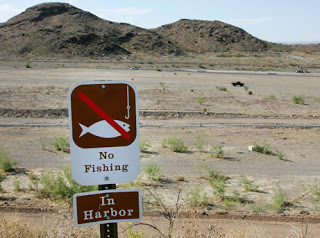Should private companies control our most precious natural resource?
 |
| Lake Mead, NV |
Jeneen Interlandi
NewsWeek
Sitka, Alaska, is home to one of the world’s most spectacular lakes. Nestled into a U-shaped valley of dense forests and majestic peaks, and fed by snowpack and glaciers, the reservoir, named Blue Lake for its deep blue hues, holds trillions of gallons of water so pure it requires no treatment. The city’s tiny population—fewer than 10,000 people spread across 5,000 square miles—makes this an embarrassment of riches. Every year, as countries around the world struggle to meet the water needs of their citizens, 6.2 billion gallons of Sitka’s reserves go unused. That could soon change.
In a few months, if all goes according to plan, 80 million gallons of Blue Lake water will be siphoned into the kind of tankers normally reserved for oil—and shipped to a bulk bottling facility near Mumbai. From there it will be dispersed among several drought-plagued cities throughout the Middle East.
The project is the brainchild of two American companies. One, True Alaska Bottling, has purchased the rights to transfer 3 billion gallons of water a year from Sitka’s bountiful reserves. The other, S2C Global, is building the water-processing facility in India. If the companies succeed, they will have brought what Sitka hopes will be a $90 million industry to their city, not to mention a solution to one of the world’s most pressing climate conundrums. They will also have turned life’s most essential molecule into a global commodity.
The transfer of water is nothing new. New York City is supplied by a web of tunnels and pipes that stretch 125 miles north into the Catskills Mountains; Southern California gets its water from the Sierra Nevada Mountains and the Colorado River Basin, which are hundreds of miles to the north and west, respectively. The distance between Alaska and India is much farther, to be sure. But it’s not the distance that worries critics. It’s the transfer of so much water from public hands to private ones. “Water has been a public resource under public domain for more than 2,000 years,” says James Olson, an attorney who specializes in water rights. “Ceding it to private entities feels both morally wrong and dangerous.”
Everyone agrees that we are in the midst of a global freshwater crisis. Around the world, rivers, lakes, and aquifers are dwindling faster than Mother Nature can possibly replenish them; industrial and household chemicals are rapidly polluting what’s left. Meanwhile, global population is ticking skyward. Goldman Sachs estimates that global water consumption is doubling every 20 years, and the United Nations expects demand to outstrip supply by more than 30 percent come 2040.
Proponents of privatization say markets are the best way to solve that problem: only the invisible hand can bring supply and demand into harmony, and only market pricing will drive water use down enough to make a dent in water scarcity. But the benefits of the market come at a price. By definition, a commodity is sold to the highest bidder, not the customer with the most compelling moral claim. As the crisis worsens, companies like True Alaska that own the rights to vast stores of water (and have the capacity to move it in bulk) won’t necessarily weigh the needs of wealthy water-guzzling companies like Coca-Cola or Nestlé against those of water-starved communities in Phoenix or Ghana; privately owned water utilities will charge what the market can bear, and spend as little as they can get away with on maintenance and environmental protection. Other commodities are subject to the same laws, of course. But with energy, or food, customers have options: they can switch from oil to natural gas, or eat more chicken and less beef. There is no substitute for water, not even Coca-Cola. And, of course, those other things don’t just fall from the sky on whoever happens to be lucky enough to be living below. “Markets don’t care about the environment,” says Olson. “And they don’t care about human rights. They care about profit.”
RELATED ARTICLE:
10 Reasons Our Shallow Fresh Water Supply is in Deep Trouble

Be the first to comment on "The New Oil: Water Becoming Our Most Precious Resource"